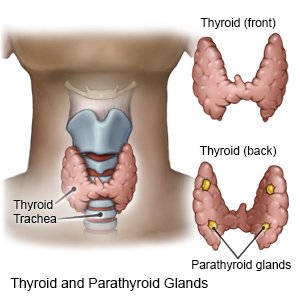Hypercalcemia
Medically reviewed by Drugs.com. Last updated on Aug 4, 2025.
Hypercalcemia is a high level of calcium in your blood. Calcium levels are kept in balance by your parathyroid glands. Your parathyroid glands are located in your neck near your thyroid gland.
 |
WHILE YOU ARE HERE:
Informed consent
is a legal document that explains the tests, treatments, or procedures that you may need. Informed consent means you understand what will be done and can make decisions about what you want. You give your permission when you sign the consent form. You can have someone sign this form for you if you are not able to sign it. You have the right to understand your medical care in words you know. Before you sign the consent form, understand the risks and benefits of what will be done. Make sure all your questions are answered.
Medicines:
- Medicines may be given to decrease calcium levels by preventing bone breakdown. Calcium is stored in your bones. Calcium is released when bone breaks down.
- Steroids help lower calcium levels by decreasing the amount of calcium that is absorbed in your intestines.
- Loop diuretics help your body get rid of extra calcium through your urine.
Related medications
Tests:
- Blood and urine tests will be done to measure your calcium and parathyroid hormone levels.
- An EKG records your heart rhythm and how fast your heart beats. It is used to check for any changes in your heart rhythm and heartbeat caused by hypercalcemia.
Treatment:
- IV fluids may be given to treat dehydration and to help your body get rid of extra calcium.
- Surgery may be needed to remove one or more parathyroid gland.
Treatment options
The following list of medications are related to or used in the treatment of this condition.
RISKS:
Without treatment, hypercalcemia can become severe. You may develop other health problems, such as dehydration, kidney stones, and osteoporosis. Hypercalcemia can affect your heart rhythm and nervous system, and can lead to a coma.
CARE AGREEMENT:
You have the right to help plan your care. Learn about your health condition and how it may be treated. Discuss treatment options with your healthcare providers to decide what care you want to receive. You always have the right to refuse treatment.© Copyright Merative 2025 Information is for End User's use only and may not be sold, redistributed or otherwise used for commercial purposes.
The above information is an educational aid only. It is not intended as medical advice for individual conditions or treatments. Talk to your doctor, nurse or pharmacist before following any medical regimen to see if it is safe and effective for you.
Learn more about Hypercalcemia
Treatment options
Care guides
Further information
Always consult your healthcare provider to ensure the information displayed on this page applies to your personal circumstances.
